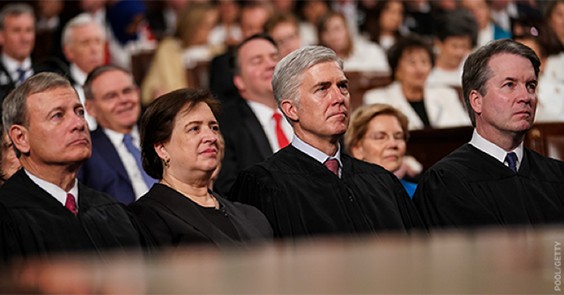[FAIR COURTS]

Supreme Court
Dismissal of Misconduct Complaints Against Kavanaugh Affirmed, But Dissenting Opinion May Allow for Further Appeals
Last week, the Tenth Circuit Judicial Council affirmed its decision dismissing 83 complaints of judicial misconduct filed against Justice Brett Kavanaugh. The complaints against Kavanaugh alleged, among other things, that he made false statements during his nomination proceedings to the D.C. Circuit in 2004 and 2006 and to the U.S. Supreme Court last year.
In a 6–1 decision, the Judicial Council affirmed its previous order dismissing the complaints of judicial misconduct against Kavanaugh. The panel explained in its original holding, “Justice Kavanaugh’s confirmation to the Supreme Court – has made the complaints no longer appropriate for consideration.”
But dissenting Judge Mary Beck Briscoe argued that it was not proper for the Judicial Council to review its own decision, concluding that “the petitions for review should be considered by a different body, specifically the Judicial Conference Committee on Judicial Conduct and Disability.” Judge Briscoe also observed in a footnote that “petitioners can presumably petition the Judicial Conference Committee on Judicial Conduct and Disability for review of the Council’s order” in light of her dissent.
Judge Carlos Lucero recused himself from consideration of the complaint “[f]or the reasons stated by Judge Briscoe in her dissent.”
2020 Democratic Presidential Candidates Indicate Openness to Supreme Court Reform
Senate Republicans blocked President Obama’s Supreme Court nominee Merrick Garland in 2016, arguing that Justice Scalia’s replacement should be chosen by the next president. Once President Trump assumed office, the Senate rapidly confirmed his nominee, Neil Gorsuch.
Some Democratic presidential contenders, including Sen. Elizabeth Warren, Mayor Pete Buttigieg, and Sen. Kamala Harris, have indicated “they would not rule out expanding the Supreme Court” or enacting other judicial reforms to depoliticize the selection process if elected president. In an interview with Politico, Sen. Gillibrand said “she believes Justice Neil Gorsuch essentially possesses an illegitimate seat.” Sen. Harris argued, “We are on the verge of a crisis of confidence in the Supreme Court… [E]verything is on the table.”
According to Politico, groups such as Demand Justice and Indivisible have driven the effort to center court reform in the 2020 election. A new group called Pack the Courts is also aiming to spend $2 million on advocating for court expansion during the 2020 presidential election, arguing, “the court has been stolen.”
Following these comments, Rep. Mark Green introduced and Sen. Marco Rubio has announced plans to introduce a constitutional amendment limiting the number of Supreme Court justices to nine.
Judicial Diversity
New Study Finds that Race, Gender, and Age of State Supreme Court Justices Impacts Authorship of Majority Opinions
A new study evaluating three years of state supreme court opinions in states where opinion assignment is discretionary rather than random or rotational suggests that the race, gender, and age of a state high court justice may affect the likelihood of their authoring a majority opinion in a case.
The researchers found that “female justices were more likely to be asked to write the majority opinion,” particularly in cases involving a “women’s issue.” Female and Black justices “were less likely to be selected to write the majority opinion” in cases considered complex. The study also found that “female and [B]lack justices are less likely to be selected to write the majority opinion as they get older while their non-minority male peers are selected for this task at higher rates with advancing age.”
Robert K. Christensen, one of the study’s co-authors, explained that, “[m]ajority opinion authors have significant power to shape law and policy. They become the voice of the court. We feel that society needs to understand which voices are chosen from a variety of perspectives, including demographic representation.”
State Courts
Arkansas House Moves Bill to Require Disclosure by Outside Groups in Judicial Elections
Last week, the Arkansas House Judiciary Committee voted to advance HB 1705 to the full House floor. Introduced by state Rep. Jimmy Gazaway (R-Paragould), the bill would require outside groups spending money on Arkansas Supreme Court or Appeals Court races to disclose their donors.
Last year, in her successful bid for re-election, Justice Courtney Goodson faced extensive opposition by outside special interest groups after having faced similar opposition in 2016 during her unsuccessful bid to be the court’s chief justice. Two national conservative organizations, the Republican State Leadership Committee’s Judicial Fairness Initiative (RSLC-JFI) and the Judicial Crisis Network (JCN), spent over $1.9 million and over $510,000 on the race, respectively. And some of those ads were subject to litigation and temporarily blocked from airing in certain parts of the state for their misleading content. Neither group is fully transparent as to the sources of their spending.
The Associated Press reports that the bill “would expand the definition of independent groups that are required to file reports [to include those spending on state Supreme Court or Appeals Court races] with the state and would require them to release detailed reports about their donors.”
The bill was pulled by Gazaway due to concerns raised after the bill advanced to the House floor for a vote, but has since been re-referred to the House Committee on the Judiciary.